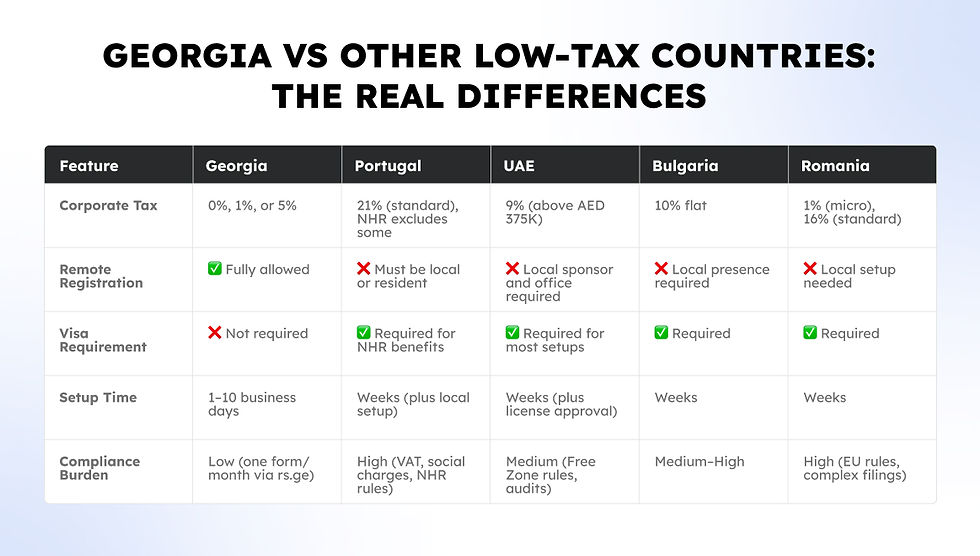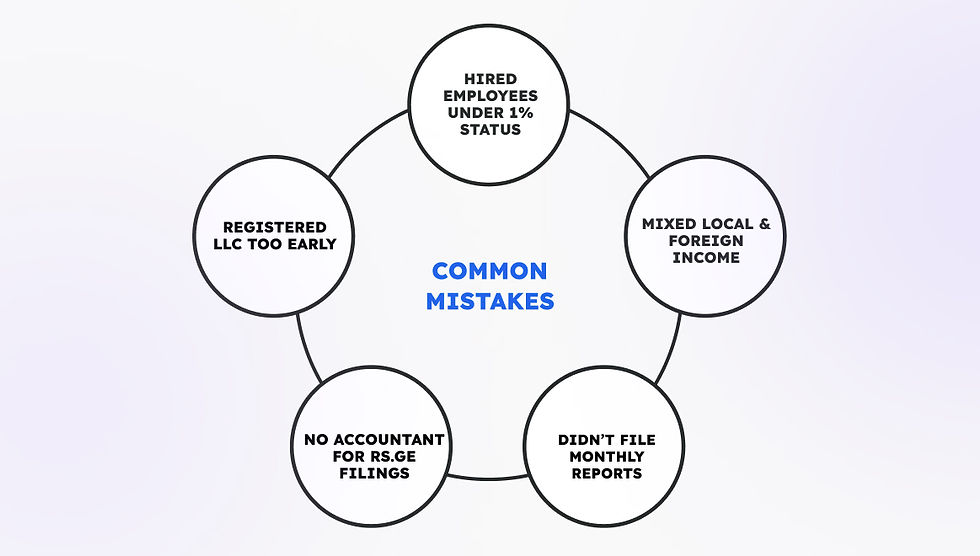Georgia’s IT Tax Regime vs Other Tech-Friendly Countries: Why Companies Are Relocating Here
- Tinatin Tolordava
- Aug 17, 2025
- 9 min read

Table of contents
Georgia’s IT Tax System Is Making Noise for a Reason
Tech founders are tired. Tired of overpaying, over-reporting, and under-benefiting. Whether it's the administrative bloat in Western Europe or the fine print behind "zero tax" in Dubai, entrepreneurs have started looking for a smarter setup.
Enter Georgia.
This small country between Europe and Asia has quietly become one of the most competitive tax environments for IT companies. It’s not just about the low rates. It’s the structure. The clarity. The speed. And yes, the fact that you can pay 1%, 5%, or even 0% depending on how your business is set up.
Startups, agencies, and solo developers are all landing here. And Gegidze, a firm that’s helped hundreds make that move, is right in the middle of this shift.
Three Clear Models: 1%, 5%, or 0%
You choose your structure in Georgia. Not the other way around.
The government offers three tax setups that IT businesses can use, depending on size, revenue, and hiring plans:
1% turnover tax under Small Business Status (for Individual Entrepreneurs)
5% corporate tax under International Company Status (for LLCs)
0% corporate tax under Virtual Zone Status (for LLCs)
Each regime is governed by published tax codes. You apply online through public platforms like the Revenue Service Portal (rs.ge). No need to hide money. No need to chase tax treaties. Just file properly, and you’re good.
Even better: You don’t need to live in Georgia to use the system. Remote company registration is possible. Many of Gegidze’s clients operate entirely from abroad while staying fully compliant.
Individual Entrepreneur with Small Business Status (1%)
Who it's for
This model is built for people who work alone. Think freelance developers, marketers, consultants, copywriters, and product designers.
If your work is digital, and your clients are outside Georgia, you probably qualify.
How it works
You register as an Individual Entrepreneur (I.E.)
You apply for Small Business Status via rs.ge
You pay 1% of your total turnover, capped at 500,000 GEL per year (about $185,000)
You file monthly declarations
You pay the tax due by the 15th of the following month
That’s it.
There are no corporate income taxes. No dividend taxes. No mandatory social security payments. You keep almost everything you earn.
Real numbers
If you invoice $80,000 in a year, you pay $800 in taxes.
If you invoice $180,000, you pay $1,800.
No deduction gymnastics. No questions about profit. No “what counts as a business expense?” conversations. You just pay 1% of what you make.

What you can’t do
You can’t hire full-time employees under this structure.
If you’re planning to build a team or scale beyond yourself, the 1% model won’t work long term. You’ll need to graduate to a Limited Liability Company (LLC).
Virtual Zone Status (0% Tax)
A structure made for software exporters
Georgia’s Virtual Zone Status is tailor-made for one type of business: software development companies that export their services.
This includes:
SaaS businesses
Custom software developers
AI product companies
Dev shops
App builders
White-label IT service providers
If your product or service is digital and your clients are not in Georgia, this is likely the best path.
How it works
You register a Georgian LLC
You apply for Virtual Zone Status through the Ministry of Finance
If approved, your company pays 0% corporate income tax on foreign-source income
You still pay salary tax if you employ anyone in Georgia. You still submit monthly filings. But your profit stays untaxed, as long as it comes from software exported abroad.
The catch?
You need to follow compliance rules, including:
Monthly VAT and income declarations (even if you owe zero)
Annual balance sheets
Keeping contracts and invoices in proper format
Filing through the Revenue Service Portal
It’s not difficult. But it’s not casual either. That’s why most founders work with legal partners like Gegidze to stay compliant and audit-ready.
How fast is it?
You can get Virtual Zone approval within 7–10 business days if your paperwork is in order. But don’t expect help from government agencies, navigating rs.ge is hard if you don’t read Georgian. That’s where legal professionals come in.
International Company Status (5%)
Built for tech companies that want to scale in Georgia
The International Company model is designed for companies that go beyond solo work. If you’re planning to hire employees in Georgia, rent an office, or build long-term operations here, this regime is designed for you.
To qualify, your LLC must:
Operate in an eligible sector (primarily IT or maritime)
Have at least 2 local employees
Earn at least 100,000 GEL annually
Be managed from Georgia with a registered address
Once approved, you get serious benefits:
5% corporate tax on distributed profits
0% dividend tax for owners
5% personal income tax for employees (instead of 20%)
This isn’t a tax dodge. It’s a legitimate legal status backed by tax law and supported by the Revenue Service. And unlike Dubai’s “zero tax” promise, it comes with actual structure and digital filing.
Why go for this status?
Because once you start hiring locally, the 1% model becomes impossible. And Virtual Zone Status doesn’t offer the same payroll and dividend advantages.
This structure is ideal for agencies, dev teams, and fast-growing startups.
Key Differences Between the Three

Who should use what?
Business Size | Recommended Structure |
Solo / Freelancer | I.E. with Small Business Status |
Small Product Team (No local hires) | LLC with Virtual Zone |
Scaling Company (Local hires) | LLC with International Company Status |
What are the core differences?
Feature | 1% Regime | Virtual Zone | International Company |
Entity Type | I.E. | LLC | LLC |
Corporate Tax | 0% | 0% on foreign profit | 5% |
Max Revenue | 500,000 GEL | None | None |
Payroll Option | Not allowed | Optional | Required |
Local Employees | Not allowed | Optional | Mandatory |
Compliance Needs | Low | Medium | High |
Popular With | Freelancers | SaaS, devs | Agencies, startups |
Real Benefits That Go Beyond the Tax Rate
Georgia’s tax advantages go deeper than percentages.
Fast setup
You can register a company in as little as 1 day. Virtual Zone status takes under 2 weeks. International Company Status, if well-prepared, can be secured within a month.
Remote-friendly
You can register from abroad. Open a bank account. Manage everything online. Gegidze can assist with registration, bank opening, and ongoing compliance even if you’re never in Georgia physically.
No hidden reporting traps
There are no global income declarations. You don’t need to report your personal foreign bank accounts. There’s no capital gains tax on crypto. And if you’re a tax resident of Georgia, your foreign dividends and interest are not taxed here.
Easy translations
While government websites and forms are mostly in Georgian, professionals handle translations and submission. You don’t need to use Google Translate Georgian to English for every document. (Although it helps to know basic terms.) Firms like Gegidze handle both English to Georgian and Georgian to English filings routinely.

How Does Georgia Compare to Other “Low-Tax” Tech Hubs?
You’ve seen what Georgia offers. Now let’s look at how it stacks up against other popular options.

United Arab Emirates (UAE)
The UAE is often marketed as a zero-tax haven for tech startups. But that’s only partially true.
As of June 2023, the UAE introduced a 9% corporate tax on businesses earning over AED 375,000 (roughly $102,000). This change affected many small and midsize tech companies who previously relied on the zero-tax promise.
There’s still no personal income tax. But:
You must operate under a Free Zone to avoid VAT or customs headaches
Costs for setup, visas, and office space are high
You need a local presence, often with physical office leases
Compliance is more rigid than it seems on the surface
Compared to Georgia?
In Georgia, if you're under the 1% or Virtual Zone regime, you’re still paying zero to very low tax with no minimum office space, no visa requirement, and no physical presence needed.
Plus, the cost of living is dramatically lower. A remote founder can rent a full apartment in Tbilisi for the price of a hot desk in Dubai.
Portugal
The lure of NHR (Non-Habitual Residency)
Portugal offers attractive tax incentives under the NHR regime, including:
20% flat income tax for high-value professions
0% on foreign passive income (under certain rules)
But NHR:
Does not apply to corporate income
Doesn’t exempt you from VAT, dividend tax, or social charges
Is only valid for 10 years
Plus, registering a company in Portugal means:
Full accounting costs
Monthly filings with complex VAT structures
Social contributions of up to 23.75% on salaries
No equivalent of Georgia’s 1% turnover tax
For freelancers and small agencies, Georgia is far simpler. One form per month. One flat rate. One clear rule.
Romania
A rising nearshore hub, but still heavy on red tape
Romania has become a popular IT outsourcing destination thanks to its EU membership and large developer base. Tax-wise, it offers:
1% corporate tax for micro-enterprises, capped at 500,000 EUR annual turnover
16% standard corporate tax for larger companies
5% dividend tax
Sounds close to Georgia, right?
Here’s where it differs:
Romania requires minimum capital deposits for LLCs
VAT registration is required once revenue exceeds €88,500
Payroll reporting and tax filing are far more complex
EU compliance laws add extra layers of bureaucracy
Also, Romania has no virtual zone or simplified IT-specific regime.
In Georgia, you can operate an LLC with zero capital, get Virtual Zone in 7–10 days, and legally pay 0% tax on foreign software income.
Bulgaria
Simple flat tax, but limited flexibility
Bulgaria’s standout feature is its 10% flat corporate tax and 10% personal income tax.
It’s good, but not better than Georgia’s 0% or 1% options. And unlike Georgia, Bulgaria:
Requires accounting in Bulgarian
Requires physical business presence
Has more aggressive tax authority audits
Doesn’t offer IT-specific incentives
You also pay social security contributions of around 32% on employee salaries. That adds up quickly.
In Georgia, if you’re under International Company Status, employee payroll tax is just 5% flat, no additional contributions.
Real-World Use Cases
Case 1: Freelance software developer based in Berlin
Challenge: Tired of 30%+ tax on freelance income in Germany
Solution: Registers as an Individual Entrepreneur in Georgia, gets Small Business Status, pays 1% on all invoices to EU clients
Tax result: €80,000 revenue → €800 in Georgian tax, 0% in Germany due to DTA.
Case 2: Small SaaS team scaling from Armenia
Challenge: Wanted to scale operations without growing tax burden
Solution: Registers Georgian LLC, obtains Virtual Zone Status, pays 0% tax on B2B SaaS sales to US and EU
Team: Operates remotely from Yerevan, no Georgia-based staff
Compliance: Monthly filings handled by Gegidze’s tax team
Case 3: European founder building a dev agency
Challenge: Needed to hire developers legally in Georgia but avoid complex payroll
Solution: Forms a Georgian LLC, applies for International Company Status, hires 5 local devs, gets 5% personal income tax for employees
Result: Legal payroll, 5% tax on profits, full transparency for international clients
Common Mistakes to Avoid

Mistake 1: Registering an LLC when 1% status is enough
You don’t need to overcomplicate things if you’re working solo. Starting with the Individual Entrepreneur model keeps you flexible, low-cost, and fast.
Mistake 2: Trying to avoid tax without understanding source rules
Georgia only taxes source income. If you operate from abroad, file from Georgia, and get paid from overseas, you're likely in the clear. But if you live in Germany and file nothing there, you risk penalties. Gegidze helps you stay compliant in both countries if needed.
Mistake 3: Hiring employees under the 1% regime
This isn’t allowed. You can pay freelancers or contractors, but full-time employees require a legal structure like an LLC with payroll setup.
Mistake 4: Not keeping proper records
Even with 0% or 1% tax, you still need to file monthly. If you miss deadlines or file incorrectly, you risk fines. Work with someone who understands the system.
Why Tech Founders Are Relocating to Georgia
It’s not hype. It’s not loopholes. It’s smart law.
Georgia built a system that actually works for modern tech businesses.
No unnecessary taxes
Legal remote registration
Transparent filing through rs.ge
No corporate games
And support from experienced firms like Gegidze
Whether you're looking to translate your business strategy into Georgian tax code or open a company without flying in, the country’s infrastructure makes it easy. And affordable.
You don’t need to “opt in” to some niche program. The system was built this way. You just need to use it right.
At Gegidze, we help founders register, relocate, and run their businesses in Georgia without confusion or delays. From choosing the right tax regime to handling filings, payroll, and local compliance, we make sure you’re set up the right way from day one. Ready to make Georgia your base? Let’s get started.
Frequently asked questions (FAQ)
What is the best country to relocate an IT company to in 2025?
Georgia is quickly becoming one of the most tax-efficient countries for relocating IT businesses, offering 0%, 1%, or 5% tax models depending on your structure and goals.
How does Georgia’s IT tax system compare to the UAE?
Unlike the UAE, Georgia’s tax system offers lower or zero taxes without requiring expensive office space, local sponsors, or visa setups. Remote registration is fully legal.
Can freelancers really pay only 1% tax in Georgia?
Yes. Individual Entrepreneurs with Small Business Status pay 1% on turnover up to 500,000 GEL per year. This is ideal for remote freelancers working with international clients.
What is Virtual Zone Status in Georgia?
It’s a special status for IT companies that export software and services. Profits earned from foreign clients are taxed at 0% under this regime.
Is Georgia a good option for European founders?
Absolutely. With legal remote setups, DTA protection, and tax rates far lower than Germany, France, or the Netherlands, Georgia is increasingly chosen by European tech founders.



